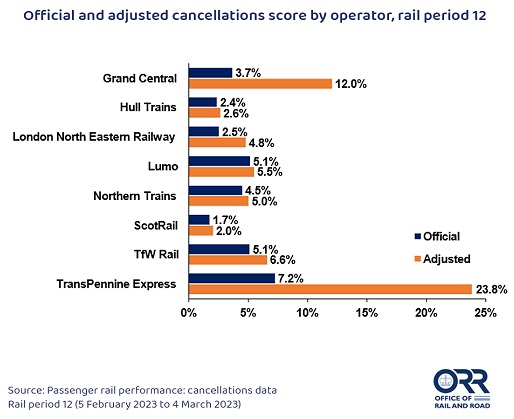Posted 17th March 2023 | 2 Comments
ORR calls for full cancellation figures to be published

The rail regulator is telling the industry that it can no longer leave out cancellations from official statistics when the decision not to run a train is made no later than the night before.
Such trains have been known as ‘P*-coded’, which stands for ‘pre-cancelled’. They are significant because such cancellations are not included in the official statistics.
The Office of Rail and Road has highlighted TransPennine Express, where the cancellation total increased from 7.2 per cent to 23.8 per cent when P*-coded trains cancelled because train crew were not available were included.
The ORR said that between 5 February and 4 March TPE had fully ‘pre-cancelled’ 1,093 trains, and ‘part pre-cancelled’ another 532.
Northern and ScotRail also reported ‘significant numbers of full pre-cancelled services’ caused by a shortage of train crew, losing 380 and 159 trains respectively. Transport for Wales recorded 98 full and 159 part pre-cancellations because rolling stock was not available.
Another four of the 24 British train companies, including three open-access operators, also reported P*-coded cancellations and are included in the statistics published today.

The regulator has now instructed the rail industry to change how it records ‘pre-cancellations’ and to introduce a clearer way of working when making late changes to services.
A suitable plan has yet to be introduced, and until the practice ceases, the ORR said it ‘will continue to publish this data to ensure full transparency’.
The ORR’s director, planning and performance, Feras Alshaker said: ‘Until we are satisfied that official statistics reflect passenger experiences, we will make sure that information on service reliability is available for passengers and stakeholders. We acknowledge that ongoing strike action has led to a refocusing of resources elsewhere, but this should not deflect from the fact that this needs to be sorted as a matter of urgency.
‘We’ll continue to publish pre-cancellation data until we’re satisfied and should we not have a satisfactory plan from industry by the end of April, we will consider imposing a change in the way these services are recorded.’
As a result of the inclusion of “P*-coded” pre-cancellations, the national cancellations score increased by 0.4 percentage points in the latest period, to 3.3 per cent.
Reader Comments:
Views expressed in submitted comments are that of the author, and not necessarily shared by Railnews.

Steve Alston, Crewe
I cannot believe anyone could actually support the diabolical behaviour of a train company which has pocketed public money, for not running services.
In the north, we have had to put up with this disgrace of an operator for several years, risking our jobs, livelihoods with the operator cancelling the last six hours of the days service.
Chris Jones-Bridger, Buckley
Unbelievable that a debate should be taking place over cancellation statistics. The published timetable is a TOC's retail offer to it's customers, on the day a train runs or it's cancelled. If it runs it's on time or delayed. It shouldn't be more simple than that recording the stats and as I recall pre privatisation that's how it was. Of course in the privatised world there are contracts with penalties & bonuses to be considered. Could this be why the data is flawed & corrupted?
Which raises the supplementary question as to how relevant the ORR is if it is so out of touch with a basic duty such as compilation of performance statistics. As the on going strikes have continued it had been the mantra of Govt ministers that the industry has to reform & modernisation, code for cutting cost & jobs. Time to look at the function ORR performs in economic regulation of rail. Increasingly it is out of touch with reality absorbing precious funds that would be better invested in front line operations rather than abstract naval gazing.